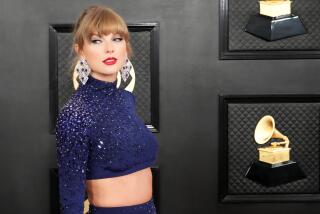Beyond the old boysâ club
Not so long ago, anyone arguing that women composers had contributed significantly to classical music had to draw on a short list of names and a handful of evidence.
Then, in 1987, James R. Briscoe published his groundbreaking âHistorical Anthology of Music by Women,â and the argument was victorious.
Or, rather, it gained considerable ammunition.
âThe battle hasnât been won yet,â Briscoe says. âA statement still has to be made about the enormous contribution of women to the musical arts and to the arts in general.â
Now, though, Briscoe is back with an expanded version of his book, the âNew Historical Anthology of Music by Womenâ -- published, like its predecessor, by Indiana Press -- and his arsenal has grown.
âThe first edition, however pioneering, was a bit rough on the edges,â he says. âThere were a number of composers we wanted but who couldnât be included because the documentation was very rough or the manuscripts were still in Renaissance notation. The scores were too poor to use for reprinting.â
The first book helped launch a spate of scholarly works about female composers, along with a slew of college and conservatory classes.
Thus, the new book -- largely intended as a college text but still useful to general readers -- includes 55 scores by 46 female composers from the ancient Greeks to the present, 10 more than in the original volume. Each work is prefaced by a biographical and critical essay. A three-CD supplement allows immediate hearing.
Familiar names are here -- Hildegard von Bingen, Clara Wieck Schumann, Alma Mahler -- but also many new ones, including Dame Maroie de Diergnau, May Frances Aufderheide, Elsa Barraine, Florence Price, Margaret of Austria and Elisabeth de la Guerre.
âDe la Guerre was a favorite of Louis XIV,â Briscoe says, âthough strictly artistic, it would seem. She made an important contribution to French culture.â
Some might find it ironic that a man compiled these two editions. Briscoe doesnât.
âAs Simone de Beauvoir wrote in âThe Second Sex,â only when both sexes are given their full power can the wholeness of the human couple be discovered,â he says.
âIf l long for a wholeness for our society, I think that benefits both men and women. So thereâs a kind of selfish end: I want to learn more, be a more complete musician.â
Thereâs an even more personal reason.
âI have three women in my life, two daughters and a wife, whom I want to have a life capable of full opportunities. Their presence has always formed a power in my life.â
Briscoe points particularly to prejudice as having denied women opportunities.
âThe prohibition on publication and performance has done more to squelch womenâs production than anything,â he says. âFrom about 1950, we have seen women break through those prohibitions.â
Still, someone is always asking, if all this is true, why hasnât there been a female Beethoven?
âWomen have been most important for representing their society, more than for setting society on fire,â Briscoe answers. âThey are more systemic as creators, rather than coming from outside. I donât know if it has to do with testosterone. Men are known to be fighters, outside agents. Women show society at its best coming from inside out.
âThe question is not quite right. The question should be: Why have women composers done what theyâve done so well? -- which is, worked within the system and created singularly important things from there.â
More to Read
The biggest entertainment stories
Get our big stories about Hollywood, film, television, music, arts, culture and more right in your inbox as soon as they publish.
You may occasionally receive promotional content from the Los Angeles Times.










